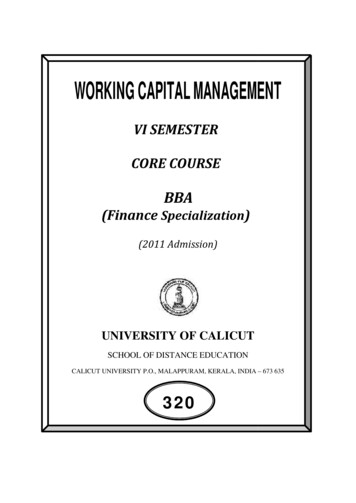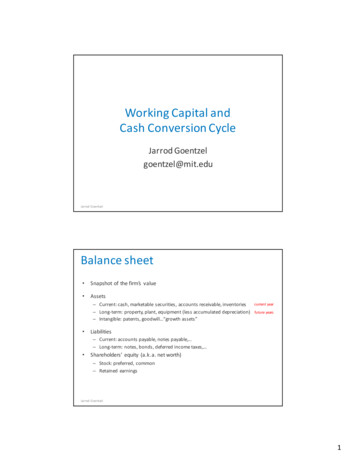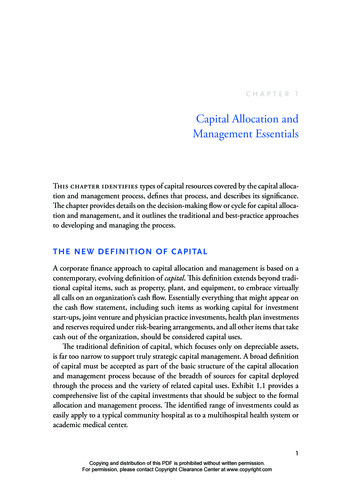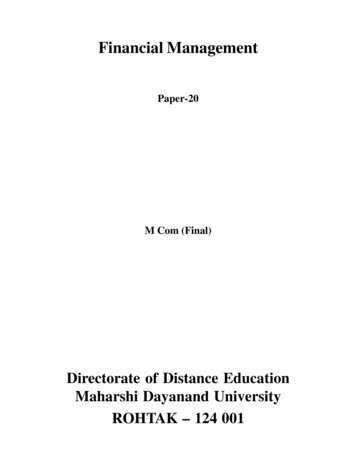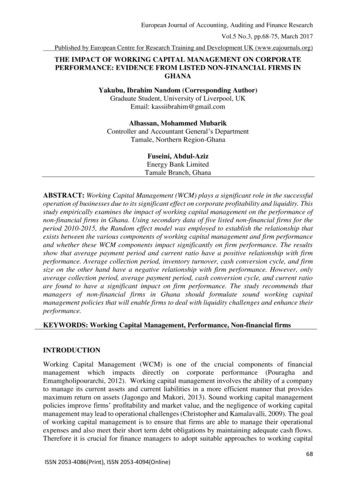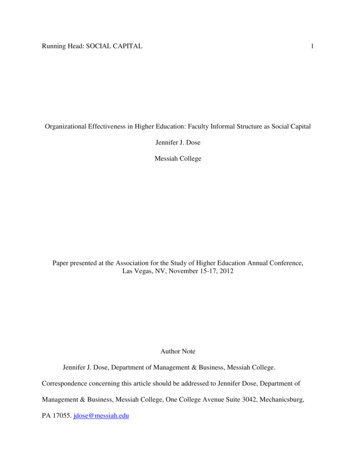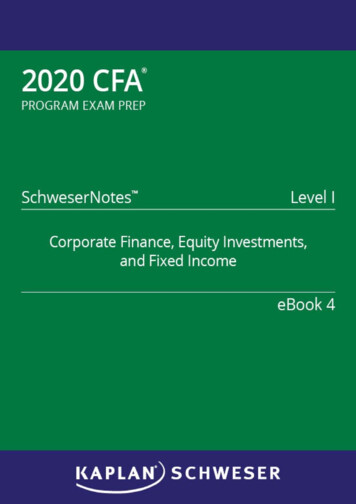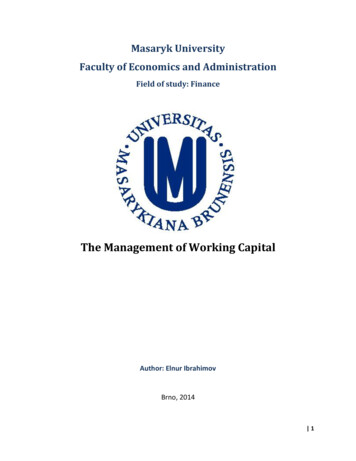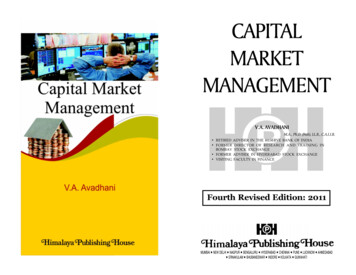
Transcription
CAPITAL MARKET MANAGEMENTMANAGEMENT THEORY AND FINANCIAL SERVICESCAPITALMARKETMANAGEMENTV.A. AVADHANIM.A., Ph.D. (Neb), LL.B., C.A.I.I.B. RETIRED ADVISER IN THE RESERVE BANK OF INDIA FORMER DIRECTOR OF RESEARCH AND TRAINING INBOMBAY STOCK EXCHANGE FORMER ADVISER IN HYDERABAD STOCK EXCHANGE VISITING FACULTY IN FINANCEFourth Revised Edition: 2011MUMBAI NEW DELHI NAGPUR BENGALURU HYDERABAD CHENNAI PUNE LUCKNOW AHMEDABAD ERNAKULAM BHUBANESWAR INDORE KOLKATA GUWAHATI
CAPITAL MARKET MANAGEMENT AuthorNo part of this publication may be reproduced, stored in a retrieval system, ortransmitted in any form or by any means, electronic, mechanical, photocopying,recording and/or otherwise without the prior written permission of the publishers.First EditionSecond Revised EditionThird Revised EditionReprintFourth Revised Edition:::::19952001200720092011Published by: Mrs. Meena Pandey for Himalaya Publishing House Pvt. Ltd.,“Ramdoot”, Dr. Bhalerao Marg, Girgaon, Mumbai - 400 004.Phone: 022-23860170/23863863, Fax: 022-23877178E-mail: himpub@vsnl.com; Website: www.himpub.comBranch Offices:New Delhi: “Pooja Apartments”, 4-B, Murari Lal Street, Ansari Road,Darya Ganj, New Delhi - 110 002.Phone: 011-23270392, 23278631; Fax: 011-23256286Nagpur: Kundanlal Chandak Industrial Estate, Ghat Road,Nagpur - 440 018. Phone: 0712-2738731, 3296733;Telefax: 0712-2721215Bengaluru: No. 16/1 (Old 12/1), 1st Floor, Next to Hotel Highlands,Madhava Nagar, Race Course Road, Bengaluru - 560 001.Phone: 080-32919385; Telefax: 080-22286611Hyderabad: No. 3-4-184, Lingampally, Besides Raghavendra SwamyMatham, Kachiguda, Hyderabad - 500 027.Phone: 040-27560041, 27550139; Mobile: 09848130433Chennai: No. 85/50, Bazullah Road, T. Nagar, Chennai - 600 017.Phone: 044-28144004/28144005Pune: First Floor, "Laksha" Apartment, No. 527,Mehunpura, Shaniwarpeth (Near Prabhat Theatre),Pune - 411 030. Phone: 020-24496323/24496333Lucknow: Jai Baba Bhavan, Church Road, Near Manas Complex andDr. Awasthi Clinic, Aliganj, Lucknow - 226 024.Phone: 0522-2339329, 4068914;Mobile: 09305302158, 09415349385, 09389593752Ahmedabad : 114, “SHAIL”, 1st Floor, Opp. Madhu Sudan House, C.G. Road,Navrang Pura, Ahmedabad - 380 009. Phone: 079-26560126;Mobile: 09327324149, 09314679413Ernakulam: 39/104 A, Lakshmi Apartment, Karikkamuri Cross Rd.,Ernakulam, Cochin - 622011, Kerala.Phone: 0484-2378012, 2378016;Mobile: 09344199799Bhubaneswar : 5 Station Square, Bhubaneswar - 751 001 (Odisha).Mobile: 09861046007Indore: Kesardeep Avenue Extension, 73, Narayan Bagh, Flat No. 302,IIIrd Floor, Near Humpty Dumpty School, Indore - 452 007 (M.P.).Mobile: 09301386468Kolkata: 108/4, Beliaghata Main Road, Near ID Hospital, Opp. SBI Bank,Kolkata - 700 010, Phone: 033-32449649; Mobile: 09910440956Guwahati: House No. 15, Behind Pragjyotish College, Near Sharma PrintingPress, P.O. Bharalumukh, Guwahati - 781009 (Assam).Mobile: 09883055590, 09883055536DTP by: HPH, Editorial Office, Bhandup (Priyanka)Printed by: A to Z Printers, New Delhi.MANAGEMENT THEORY AND FINANCIAL SERVICESPREFACE TO THE FOURTH REVISED EDITIONCapital Market Management is a specialised subject in the area ofthe Financial Management. Capital Market is envisaged here as comprising of the money market and gilt-edged market and Primary andSecondary markets and accompanying ancillary functions like merchantbanking, registrar’s functions, etc. and stock broker’s functions andinvestment management and portfolio management etc. The management means here the macro management by the authorities of theinfrastructure of the markets, their instruments and their architecture,including their origin and development. The book also covers the micromanagement by Finance Manager or the corporate treasurer of theoperations in these markets and the ancillary functions in them.The objective of this book is to keep the management studentsabreast of the functions and operations in the capital market as definedhere and keep them prepared to take over the responsibilities of thesefinance functions and treasury operations.This book takes the subject from the basics to higher level ofresearch and analysis. Wherever possible case study material andexamples are provided from the real world. Although more emphasis isgiven to the macro study, the principles are the same and can be appliedto the micro level operations at the firm level or corporate level. Thebook integrates management function with the finance function on theone hand and on the other hand, micro level function with the macrolevel function of the Finance manager.Starting with the Financial system of which capital markets is apart, the book delineates the money market functions and operationsfollowed by primary market and then the secondary market and lastlyinvestment management and portfolio management and other ancillaryand incidental functions in the capital markets.The developments since the reforms of 1991-92 were started weregiven special attention. These changes in environment were veryrelevant to management as he operates with environments to achieve hisgoals and objectives.In making this revision, the author was guided by the commentsand suggestions of the teaching faculty, to whom the gratefulacknowledgements were due. The author also acknowledges thecooperation and help of the Himalaya Publsihing House.AUTHOR
CAPITAL MARKET MANAGEMENTMANAGEMENT THEORY AND FINANCIAL SERVICESCONTENTSPART IVSECONDARY MARKET MANAGEMENTPART IMANAGEMENT AND FINANCIAL SERVICES1.Management Theory and Financial Services3 - 102.Capital Market Management11 - 193.Financial Services and Management20 - 254.Growth of Non-bank Financial Services26 - 325.Lease, Hire Purchase and Housing Finance33 - 596.Economy and Capital Market60 - 67PART IIMONEY MARKET MANAGEMENT7.Cash Management71 - 778.Credit Management78 - 869.Management of Money Market10.Management of Government Securities Market87 - 101102 - 11816.Management of Stock Exchanges199 - 21117.Stock Exchanges — Emerging Role212 - 22918.Management of Broker Firms230 - 26319.Activity and Recording of Broker Accounts264 - 27720.Options Trading278 - 295PART VINVESTMENT AND PORTFOLIO MANAGEMENT21.Investment Management299 - 30522.Financial Analysis of Companies306 - 31523.Fundamental Analysis of Market316 - 34324.Basics of Portfolio Management344 - 35325.Management of Mutual Funds354 - 391Epilogue392 - 398BibliographyPART IIIPRIMARY MARKET MANAGEMENT11.Capital Issues and Listing121 - 12912.Management of New Issues130 - 16213.Problems of New Issues Market163 - 16914.Merchant Banking Management170 - 18115.Management of Issue Houses182 - 195399
CAPITAL MARKET MANAGEMENTMANAGEMENT THEORY AND FINANCIAL SERVICESPART IIMONEY MARKET MANAGEMENTBRIEF CONTENTSPART IMANAGEMENT AND FINANCIAL SERVICES1.Management Theory and Financial Services–––––2.3.––4.5.6.10.26 - 32EconomyMoney FlowsFinancial Reforms78 - 86Objectives of ManagementSpecial Features of Finance CompaniesMeasure of Efficiency87 - 101Institutional StructureDiscount and Finance House of India (DFHI)New Money Market InstrumentsManagement in Money MarketManagement of Government SecuritiesMarket––––––33 - 59Features of CashSurpluses of CashMatching Cash FlowsRBI Concepts of MoneyManagement of Money Market––––20 - 25Hire PurchaseHousing FinanceHousing IndustryBanks and Housing FinanceRBI on leasing and Finance CompaniesRBI and NBFCsEconomy and Capital Market–––9.Institutions in the Non-bank Financial SectorFinancial Sector vs. Non-bank Financial SectorLease, Hire Purchase and Housing Finance––––––11 - 1971 - 77Credit Management–––Macroeconomic ManagementActivity AnalysisGrowth of Non-bank Financial Services––8.Capital Market StructureMoney ManagementFinancial Services and ManagementCash Management––––3 - 10Riches Come Rather from Management thanFrom Revenues — Michael De Montaigne, 1588Customer-oriented ServicesCrisis ManagementPrinciples of ManagementFeatures of Capital Market ManagementCapital Market Management––7.102 - 118Emergence of Public DebtManagement of Public DebtInvestment Criteria of BanksExperience in Other CountriesMaturity PatternOperations of STCIPART IIIPRIMARY MARKET MANAGEMENT11.60 - 67Capital Issues and Listing–––––121 - 129Capital Issues as a Mode of Raising ResourcesPlanning of a Capital IssueCompanies to Comply with SEBI — GuidelinesOTCEI and ListingPreferential Allotment and SEBI Directions
CAPITAL MARKET MANAGEMENT12.Management of New Issues––––––13.––14.15.18.163 - 169170 - 18119.Activity of RegistrarsInefficiencies and MalpracticesRegistration with SEBIGeneral Obligations of RegistrarsAnnexure I20.PART IVSECONDARY MARKET MANAGEMENT16.Management of Stock Exchanges––––17.Stock Exchanges — Emerging Role––EvolutionExperience Abroad21.212 - 229278 - 295Report on DerivativesTrading Patterns in the MarketsBibliographyPART VINVESTMENT AND PORTFOLIO MANAGEMENT199 - 211Listing FunctionManagement Aspects of Inspection and AuditPerformance Budgeting in Stock ExchangesReturns to the SEBI264 - 277Brokers' AccountsClient Orders – ExecutionInternet Trading by InvestorsAudit of Accounts of MembersAccounts to be Maintained — Rule 15(2)AccountsDerivatives and Options Trading–––230 - 263Client's Choice of BrokersAnnexure I– Preliminary– Registration of Stock Brokers– Registration of Sub-brokers– General Obligations and Responsibilities– Procedure for Inspection– Procedure for Action in Case of DefaultManagement of Brokers' Accounts––––––182 - 195Public Service InstitutionsCommunication TechnologyInterconnected Stock Exchange of India (ICSEI)National Stock ExchangeManagement of Broker Firms––IncorporationEnvironmental FactorsBorrowing and Acceptance of DepositsSEBI AuthorisationManagement of Issue Houses–––––––––Cost of Capital IssuesWasteful Procedures on Public IssueMerchant Banking Management––––130 - 162Flotation of New IssuesFactors to be Considered for Investmentin Primary MarketActual Mobilisation of FundsMacro and Micro New Issues ManagementAnnexure IAnnexure IIProblems of New Issues MarketMANAGEMENT THEORY AND FINANCIAL SERVICESInvestment Management–––Art and Science of InvestmentMarket AnalysisRole of Indicators in Management ofInvestment in Stock Market299 - 305
CAPITAL MARKET MANAGEMENT22.Financial Analysis of Companies–––––23.24.––344 - 353SEBI Guidelines for Portfolio ManagersSome Aspects of Portfolio ManagementPortfolio StrategyManagement of Mutual Funds––––––316 - 343Example of an Industry AnalysisFundamental Analysis of Finolex IndustriesThe Fundamentals of Reliance (RIL)Basics of Portfolio Management–––25.Analysis and InterpretationProformaRatio AnalysisFund Flow AnalysisTrend AnalysisFundamental Analysis of Market–––306 - 315354 - 391SBI Mutual FundInvestment PolicyResponse of NRIsProgress in NinetiesMoney Market Mutual Funds (MMFs)Annexure I – RBI Guidelines onMutual FundsAnnexure II – SEBI Guidelines forMutual FundsAnnexure III – Scheme for MoneyMarket Mutual Funds – Guidelines (RBI)EpilogueBibliography392 - 398399MANAGEMENT THEORY AND FINANCIAL SERVICES
CAPITAL MARKET MANAGEMENTMANAGEMENT THEORY AND FINANCIAL SERVICESCHAPTER 1MANAGEMENT THEORY ANDFINANCIAL SERVICESPART - IMANAGEMENT ANDFINANCIAL SERVICESRICHES COME RATHER FROM MANAGEMENT THANFROM REVENUES— MICHAEL DE MONTAIGNE, 1588IntroductionThe basic principles of management by objectives hold good forcapital market management also. The objectives of management infinancial services are efficiency in service, cost-effectiveness andprofitability. This is a service industry where quality counts more thanquantity. In this process, costs and profitability cannot be sacrificed. Inthe name of social obligations, banks have sacrified the productivity andprofitability which should not happen for non-bank finance companies.Thus, management in capital market requires a combination oftalents in finance area and marketing area and in personnel management(HRD). The knowledge required for this purpose is sought to be coveredin this book in a basic but exhaustive manner.This book is intended for those students of management who havesome exposure to both finance and marketing or are students of MBA. Asan area of specialisation with employment orientation and practical bias,the subject of capital market management is ideally suited to MBA studentsor M.Com. students. This gives an exposure to practices and proceduresin capital market and the institutions and agencies operating in it.Capital market deals with arranging for loans, raising of funds,dealings in capital and securities which are claims on money. But beinga service-oriented market, human element or management component isan all important and vital part of its operations.
4CAPITAL MARKET MANAGEMENTObjectives of ManagementThe management of all capital market institutions should aim atquality of service, timeliness and efficiency, cost control and profitability. The above objectives can be achieved through collaborative effortsof a host of intermediaries like merchant bankers, underwriters,registrars brokers, etc. The managers of these agencies have to bear avital responsibility and should have inter alia the expertise in humanrelations and personnel management and coordinate the activities ofvarious experts and teams in their activities. With the spread ofComputer usages and application of Information Technology in all areasof service, the subject of computer applications has to be an adjunct ofCapital Market Management.Besides, in this service industry, of non-bank financial activity,men and human relations matter, on top of practices and procedures. Inaddition to men, the other inputs that management deals with are money,monetary instruments, capital, plant and machinery involved in projectsof companies etc. The sinews of all industrial activity being finance andfinancial services, the management in capital market assumes vitalimportance to the economy. Besides, the fastest growing industry in theyears to come is financial services and the largest scope for employmentand self-employment lies in this line.It is thus important for the capital market and for the economy tobe assured of who are the future managers heading these institutions andhow competent are they. The managers of these finance companies,mutual funds, merchant banks etc., are so far bankers, CAs, and financegraduates etc., but a new professional breed of capital market managersthrough specialisation in capital market is the need of the hour. It is forthis elite professionals that this book is meant for.Fine-tuning Managers to Financial Services: TimelinessAny manager or management graduate will not fit into the area ofcapital market. The work involved is a combination of practical andtheoretical ideas put into a capsule of sale of services. It thus requiresall the management tools plus something more — a practical bias, a bentof mind and a behaviour. All the institutions in capital market are serviceoriented related to money and finance. But more importantly, aknowledge of law, a time schedule to follow as per rules and resultoriented actions are needed.Decision MakingCapacity to take decisions and right decisions, and in time is anessential part of capital market management. After gathering informa-MANAGEMENT THEORY AND FINANCIAL SERVICES5tion, classifying and analysing the data and information which is fastgrowing and put them into alternatives available, he has to chose the onewith least cost, timely and most profitable. The manager has to help thecompanies save time and money to be able to stand competition. In thepresent-day globalisation environment, competition and survival of thefittest will be the watchword and managers in the capital market haveto face this reality.Analytical PowerCorporate data is plenty and information flows in like Niagara fallsand it is the manager’s competency to pick up the correct information,analyse it and come to correct conclusions. Investment analysis andmarket analysis requires an expert financial manager.But the suitable manager for capital market should combine inhimself the expertise involved in the following areas:(a) Personnel management with a special bent for coordination ofexpert manpower with capacity for better human relations.(b) Finance management with an expertise in analysis and interpretation of financial data of companies.(c) Expertise in law and practices of capital market and knowledgeof rules and regulations relating to the capital market institutions, including SEBI and RBI.(d) Marketing management with a flair for sales promotion to meetthe competition of other institutions and increasing the marketshare in the services rendered by him.(e) Knowledge of banking law, rules and practices relating to themoney market and Forex Market to enable him to make properinvestment management in these markets, which are closelyconnected to capital market.(f) Knowledge of all non-bank financial services rendered bythese institutions and they are all interrelated, as hire purchase,lease finance, venture capital, and expertise in dealing in suchdiverse areas.CUSTOMER-ORIENTED SERVICESSome capital market services which are to be managed by thecapital market manager are individualised and customer-oriented. Insuch cases, the manager has to take note of that individual's assets,income and expenditure and his preferences for risk and return. He hasto plan the targets according to his needs and preferences. This is highly
6CAPITAL MARKET MANAGEMENTprevalent in management of investments, consultancy, and investmentadvice, and portfolio management. In financial services sector, thesetypes of services for individuals are quite common for retail investment,appeals to contribute to the IPOs Demat form of holding of shares andstock market trading and related subjects.In many segments of the capital market, the customised servicesare quite common and are governed by mutual agreement — oral orwritten — between the broker and the client. In portfolio managementand consultancy services, the individualised and customer-orientedservices, are frequently noticed in the real world. Therefore, this type ofservice in financial sector is to be well understood and appreciated.CRISIS MANAGEMENTAn efficient manager is one who can get things done in time andby the right persons in the most cost-effective manner so as to maximisethe profits of the firm. Such managers also do know how well to planin advance for all inputs and targets to be achieved.In any activity, there are possibilities of the emergence of crisissituations. In the Financial sector, there are many occasions whensuddenly there is a crash in the market, sharp fall in prices, change inthe situation of the investor, sudden withdrawal of the FFI and FIIs fromthe market. Besides there are occasions when rumours and news andinsider trading will upset the demand-supply equilibrium in any of thescrips or in any group of scrips like shipping or cement, etc.An efficient manager has to plan well in advance for any suchcontingencies and face them well without much disturbances to the planof action or the path of movement of investments. He has a long-termplan of action and the targets fixed are flexible and alternative venues arealready ingrained in the plan of action. He is well equipped to meet anysuch crisis situations.PRINCIPLES OF MANAGEMENTRight Person in Right PlaceThe leader makes all the difference. It is the management talent topick the right persons to be leaders in each division/department. Theleader should be able to think, plan and execute the plan promptly andcost-effectively. To keep ahead of competitors, he has to keep contactwith information sources of competitors, make the “SWOT” (Strengths,Weaknesses, Opportunities and Threats) analysis and to see thestrengths and weaknesses of staff and use the manpower resourceoptimally. Effective communication, good drafting, creativity andinnovation are the qualities of good managers.MANAGEMENT THEORY AND FINANCIAL SERVICES7The leaders or top management has to set the goals for eachdepartment and plan to make it a profit centre. Targets and responsibilities are earmarked for each team who along with leader will achieve theoptimum results with limited resources in terms of inputs and finance.Actual activity-wise responsibilities are set for each man and team.Men are the best assets. The manager has to manage themeffectively.1. Encourage capable and committed men.2. Train the less capable ones and motivate uncommitted men.3. Develop self-management ideas and help them to be cultivatedby delegation of authority and responsibility.Time is another valuable asset. Time is money. Develop a sense oftimeliness. Good management has time sense and plans all activities ina time-bound fashion.FinanceThe manager has to use “miserly” principle of economising in allpossible ways, but should not be pound foolish and penny wise. Themanagement has to find methods of growing two blades of grass whereonly one blade grows. He has to use innovative ideas to save on costsand money.Management of Men1. Make them thinkers, innovators and motivated.2. Manage them well by encouraging but not criticising, bycorrecting but not by humiliating.3. Motivated and committed people, even if they commit occasional mistakes are assets to a firm.Management of Time1. Eliminate time spent on inessentials.2. Reduce time spent on less-essential and have the capacity todiscriminate between the essentials and non-essentials.3. Plan the time — daily, weekly and monthly.4. Time and objective fulfillment have to be synchronised.5. Delegate authority and activity so as to optimise time.Management of FinanceFinance is a scarce resource. It has alternative uses in dailytransactions in working capital investment for raw materials and
8CAPITAL MARKET MANAGEMENTinventories and fixed capital investment in buildings, plant, machineryetc. The sources of finance are many, namely borrowing from banks,FIs, and other companies. Capital can be raised from capital marketfrom public as equity (ownership) or bonds and debentures (debt). Evenforeign capital market is now open to companies with credit standing.Each of these methods has its own cost — in the form of raising themoney, servicing it and repayment of it. Even for equity which need notbe repaid it has a cost in the form of expected yields in the minds ofinvestors, based on what they get in other and similar companies.Thus, the manager has to weigh these costs and design a capitalstructure with the least cost combination of these components. Beingscarce resource, even cash has a cost in the form of alternative incomelost. Thus, management of cash in an optimal manner involves sometalent in reducing costs and increasing profitability, for which themanager is responsible. Thus, management of finance is vital responsibility of manager in non-bank financial services. Capital marketmanagement gives crucial role to this job.Interviews and Plant VisitsManagers in capital market require to meet people, in differentgrades and levels. Communication, clarity of thinking and analyticalpower, arduous homework and ability to deal with different types ofpeople differently and with tact would be the needed qualities ofmanager. He has to visit factory managers, go around the sites of plant,visit the various departments, communicate with collaborators, suppliers, distributors etc. This is particularly important for project appraisal,investment analysis and research in all capital market intermediaries andplayers in the markets.Managers have to have a team spirit, capacity to get along withequals, superiors and subordinates and ability to communicate effectively and elicit the right information. The work involves the coordinationwith various experts, solicitors, accountants, auditors, finance managers, technicians, engineers etc. Being equals, the team requires themanagers who possess leadership qualities to throw their innovative andcreative ideas into action and lead the team of experts. Interviewing andmeeting people and asking right questions to elicit correct informationare the arts of a manager in capital market.FEATURES OF CAPITAL MARKET MANAGEMENTFinance is the product in its diverse forms that is traded in thecapital market. The managers dealing with capital market have to aim atthe objective of minimisation of cost of capital and maximisation ofMANAGEMENT THEORY AND FINANCIAL SERVICES9return through achieving increased capital productivity. Besides, capitalmarket management is a specialised branch of Financial Management,where financial risk is more prominent. Managers here have to facegreater financial risk than other types of managers. Management of riskand techniques of risk reduction should be part of their day-to-day workfor capital market managers.Capital market comprises many financial markets and sub-markets,whose characteristics and risk-return features vary and as such marketrisk is more for managers operating in the Capital Market than in otheractivities of the economy. Rupees and other currencies are the standardof measurement of their activities and results and as such purchasingpower risk is another major factor to be reckoned with. The above risksnamely financial risk, market risk and purchasing power risk arecommon to all managers but they are more for capital market managersas capital or finance is both an input and output for them.Like IT, it is a knowledge-based industry or service, where humanskills, expertise, technology, intuition and manpower performance levelscount, for the results. Both money and information flows are majorfactors influencing the operations in the capital market. Thus, liquidityin the economy, government and RBI policies on money, credit andbanking influence the operations in the capital market. The laws andregulations of the Government, RBI and SEBI have a major role in theoperations of managers here. The subject of capital market managementis different even from banking. The functions of capital marketintermediaries are different from those of banks and governed by a widerange of legislative enactments unlike banking. Non-bank financecompanies and non-banking intermediaries operate in the capital marketand provision of financial and non-financial services constitute the corepart of the activity of the capital market managers.The managerial function involves forecasting, planning, organising,staffing, directing the staff, coordinating, decision making, controllingand audit. Planning and Forecasting depends on the vision and intuitionof the management and this is a difficult process in capital marketoperations. The staff expertise required is different in that a multidisciplinaryapproach will succeed better due to diversity of activities involved andmultiplicity of laws and regulations governing these activities. Amongthe styles of management which are more suitable to capital marketmanagement, the styles of management by leadership, creativity andconsensus or coordination are better suited than the traditional types ofmanagement of centralised decision making or family type. Professionaland highly specialised personnel will better fit in for capital marketmanagement.
10CAPITAL MARKET MANAGEMENTSpecialities in Capital Market ManagementOne might ask that what has been discussed is relevant to anyeffective manager. Then what is so special about capital marketmanagement? Every body agrees that bank management is a specialityand there are special examinations of professional competence conducted by the Institute of Bankers and IBA. There are professionalorganisations like NIBM, B.T.C., and other training institutions of publicsector banks. If banking is a specialised service regulated by Banking Lawand Practice and RBI Act, non-banking financial services are morespecialised as they are governed by a variety of Acts, such as CompaniesAct, SC (R) Act, Indian Contract Act, SEBI Act, etc. Besides, theexpertise needed here is more diverse, as the functions carried on by themare many and interrelated such as activities in stock market, new issuesmarket, gilt-edged and money markets, foreign capital market, etc.Capital market management involves various disciplines, muchmore than in banking. For example, various laws, requires legalexpertise, funding business requires banking knowledge, hire purchaseand leasing requires a different expertise. Mutual funds, brokerage firms,portfolio managers and a host of other agencies require knowledge andexpertise in personal management, marketing management, fundsmanagement, investment management etc.In short, capital market management is different and morespecialised than banking. It requires a different cadre of specialists toman the increasing work of financial institutions. It is more practical andoperational and the expertise needed is different, but allied to that ofbanking.ConclusionThis book gives the background information for managers incapital market to function more effectively. The basic principles ofmanagement are assumed to be known to readers. On this premise, whatis presented in coming chapters is only the superstructure, involving thecapital market institutions, operations and practices. The word “CapitalMarket” is used in a wide sense including new issues market, stockmarket, money market, government securities market etc. The information about these markets and their operations would hopefully sharpenthe tools of management as they are down-to-earth, practical andoperational.o o oMANAGEMENT THEORY AND FINANCIAL SERVICES
the Financial Management. Capital Market is envisaged here as compris-ing of the money market and gilt-edged market and Primary and Secondary markets and accompanying ancillary functions like merchant banking, registrar’s functions, etc. and stock broker’s functions and investment management

